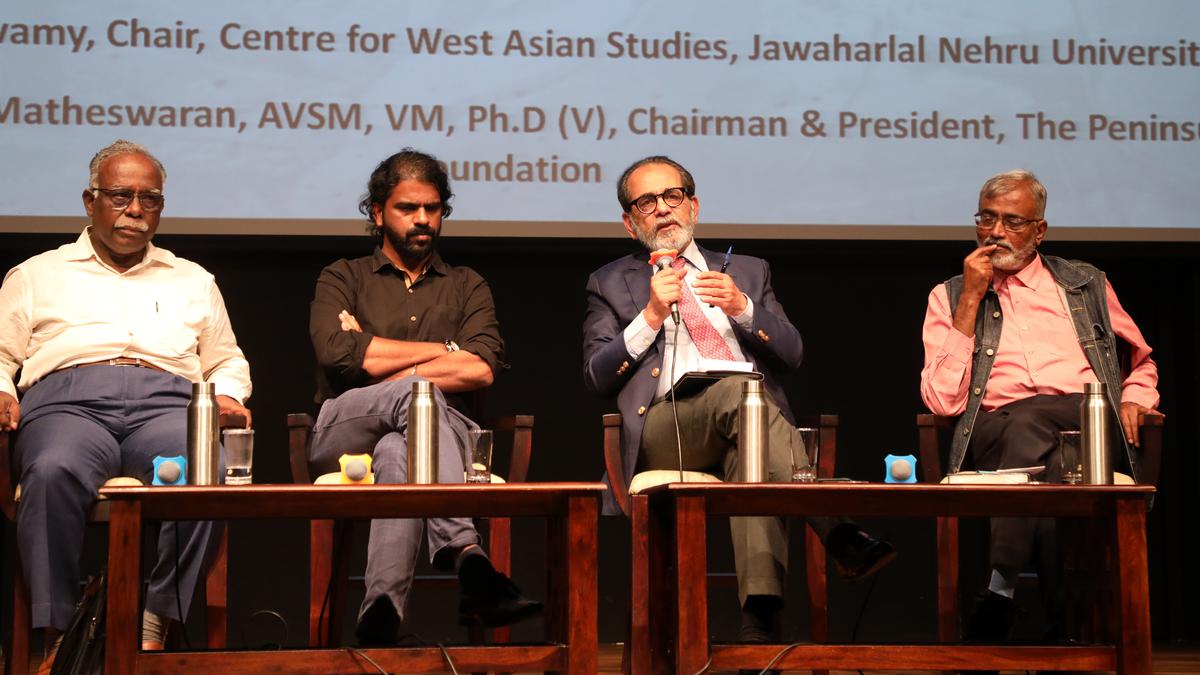
Colloquium discusses geopolitical implications of Israel-Hamas war
The Hindu
A colloquium in Chennai discusses the geopolitical implications of the Israel-Hamas war and the challenges of the Two-state solution.
At ‘Palestine: Endless Occupation, Permanent Crisis’, a colloquium organised by the Asian College of Journalism in Chennai on Sunday, a retired diplomat, an academic and a retired Air Force officer discussed the geopolitical implications of the Israel-Hamas war.
Former Indian diplomat Rakesh Sood said the idea of the ‘Two-state solution’ was “steadily undermined” by the right-wing governments in Israel for the last 25 years and the U.S. and the international community “did very little to stop that. They just stood by.”
U.S. relations with Israel are probably undergoing the “most severe test”, he said, adding the European Union was divided because it was scared of the “refugee outflow”. The Chinese liked the idea of the U.S. being distracted, but at the same time, they were “not comfortable with the economic fallout of the continuing or expanding conflict”, he said.
Professor P.R. Kumaraswamy, chair, Centre for West Asian Studies at Jawaharlal Nehru University, New Delhi, pointed out that Palestinian President Mahmoud Abbas, who assumed office in 2004, visited India six times until now but he could not set foot in Gaza strip even once.
When one talks about Palestinians, “there is a de facto separation” which exists on the ground today, he contended, and asked: “If Israel can’t unite the Palestinians, what will unite?” Rejecting the ideas of ‘Three-state solution’ and ‘One-state solution’ for the Israel-Palestine conflict, Mr. Kumaraswamy contended that the “realistic solution” and “only viable option” was the ‘Two-state solution’, even as he acknowledged that it was quite difficult to achieve.
Though there were criticisms of the U.S., Professor Kumaraswamy contended: “No matter how difficult it is, how biased the U.S. is, today we don’t have anyone other than the U.S. to do the heavy-lifting.”
Air Marshal M. Matheswaran, chairman of The Peninsula Foundation said: “In geopolitics, the geopolitical interests are governed by ruthless economic interest, and in it lies exploitation and extraction for the great powers.” He said Israel was a “geopolitical outpost” of the great powers and the “villains” were the U.S. and the U.K.

The Karnataka government has drafted a comprehensive master plan for the integrated development of Kukke Subrahmanya temple, the State’s highest revenue-generating temple managed by the Hindu Religious Institutions and Charitable Endowments Department. The redevelopment initiative is estimated to cost around ₹254 crore and aims to enhance infrastructure and facilities for devotees.












